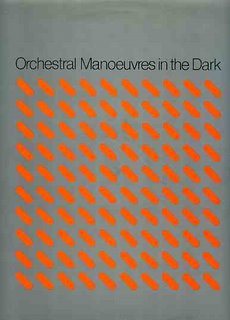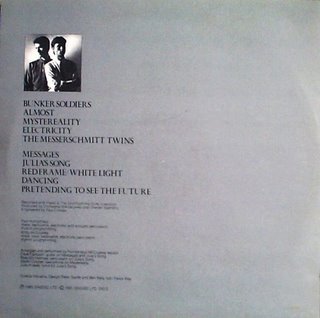OMD -omd (1980)


Released:
22 Feb 1980
Genre:
Electronic
Style:
Electro, Synth-pop
Credits:
Producer - Chester Valentino
Notes:
Music and lyrics arranged by Humphreys / McCluskeyRecorded and mixed at "The Gramaphone Suite" Liverpool
Paul Humphries - Vocals, Keyboards, Electronic and Acoustic Percussion, Rhythm Programming
Andy McCluskey - Vocals, Bass, Keyboards, Electronic Percussion, Rhythm Programming
Guitar on Julia's Song: Dave Fairbairn
Percussion on Julia's Song: Malcolm Holmes
Composed lyrics on Julia's Song: Julia Kneale
Saxophone on Mystereality: Martin Cooper
Tracklisting:
01 Bunker Soldiers (2:51)
02 Almost (3:40)
03 Mystereality (2:42)
04 Electricity (3:32)
05 The Messerschmitt Twins (5:38)
06 Messages (4:06)
07 Julia's Song (4:40)
08 Red Frame / White Light (3:11)
09 Dancing (2:59)
10 Pretending To See The Future (3:48)
Link to download:
http://rapidshare.de/files/20269073/omd__80.rar.html
biography:
Liverpool's music scene in the late 1970's was an exciting and dynamic place to be. Everyone was either in a band, in-between bands or were forming a band. In the midst of all this activity was Eric's Club - a small discreet venue that was a favoured haunt for the people who would later form bands such as The Teardrop Explodes, Echo & The Bunnymen and Frankie Goes To Hollywood. So it was quite apt that Eric's was the venue of choice for the debut performance of Orchestral Manoeuvres In The Dark in October 1978.
Founder members Andy McCluskey and Paul Humphreys had originally been inspired by the experimental electronic music of German bands such as Kraftwerk and Neu. Working with radio sets and home made synthesisers, Humphreys and McCluskey christened themselves VCLXI (after a valve diagram on the sleeve of Kraftwerk's Radioactivity album) and began their own musical experiments. This, however, was still a side project the pair indulged in on odd weekends while they were active in local bands such as Equinox, Pegasus and The Id. However, although they had gained a lot of experience from working in a traditional band environment, it was never quite the creative platform they were looking for. It was time for a new approach.
Naming themselves after an obscure VCLXI song, Humphreys and McCluskey launched their own unique style of catchy electronic melodies that helped form OMD's reputation for intelligent pop. Back then, to burden your band with such an unwieldy name as Orchestral Manoeuvres In The Dark might have seemed somewhat unwise, but the obvious commercial appeal of their music provoked enough interest that it eventually led to Factory Record's supremo Tony Wilson offering them the chance to cut their debut single 'Electricity' on the Factory label.
'Electricity' (and its flip side 'Almost') perfectly captured OMD's infectious blend of melody and melancholia. 'Electricity', with its frenetic dance rhythm, rapidly became OMD's theme song and maintained its status as a live favourite right into the 1990's. Attracting the interest of Virgin, OMD signed to their subsidiary label Din Disc in 1979. An advance from Din Disc enabled the band to plough the money into building their own studio (situated close to Eric's Club) where they could continue writing and recording new material. This included their self-titled debut album which was released the same year. After a brief period of touring, notably as support for Gary Numan, OMD quickly established themselves with a number of classic singles. 'Messages', with its simple but infectious melody, managed to get OMD into the public eye in 1980 by reaching No. 13 in the UK charts. Later the same year they made No. 8 and scored their first international hit with the dance pop of 'Enola Gay' - an up tempo number inspired by the plane that dropped the atomic bomb on Hiroshima. This bizarre style of wrapping pop songs around unusual ideas was something that OMD were to prove to be quite adept at throughout the band's career.
The success in 1980 helped OMD to rapidly become one of the UK's premier pop acts. Their initial use of extra personnel for live performances led to Humphreys and McCluskey recruiting people in the studio as well. After some initial line-up shuffles, the band soon established itself as a four piece outfit with the assistance of Martin Cooper (keyboards, saxophone) and Malcolm Holmes (drums) who were both friends from pre-OMD days. ........end of part 1.
"This has to be by far the best album by OMD. All the songs are great and this is a 'must have'. It brings back a lot of memories of the early 80's."

2 Comments:
One more time thanx!
Gary.:D
What a great site bupropion canada pharmacy paint bentley Www fluoxetine co uk venlafaxine effexor information and resources Xanax sr 1991 subaru loyale wagon 4d http://www.hummer-broken.info/answering_machine_calls.html Bontril what the companys name viagra alternative f bentley phantom bentley azure fog lights
Post a Comment
<< Home